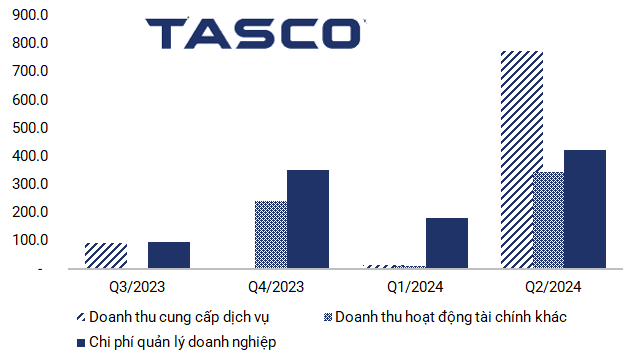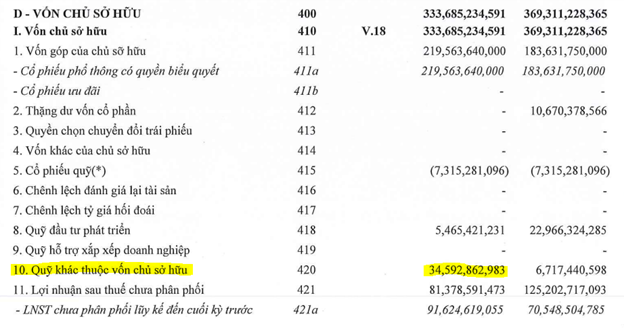In an interview with VTC News, Mr. Nguyen Tuan Quynh, founder and chairman of Saigon Books, candidly shared the mistakes he made during his entrepreneurial journey. From always being confident and thinking he was skilled and right, to making costly mistakes. Despite these setbacks, the chairman of Saigon Books is content with his experiences.

– After many years in the gas, jewelry, and fuel industries, among others, and holding key leadership positions, there must be a special reason why you decided to start Saigon Books at the age of 44?
Yes! I spent 11 years working for a state-owned company, Saigon Petro, and the following 11 years with other large enterprises such as Phu Nhuan Jewelry Company (PNJ), Saigon Fuel Company (SFC), and Phuong Nam Culture Joint Stock Company.
After these experiences, I realized that one of the things I hadn’t tried was starting my own business, in other words, entrepreneurship.
This is why I decided to stop working for corporations and large companies and embark on my own entrepreneurial journey.
Before starting Saigon Books in 2016, I counted that I had been involved with around 40 companies as an investor, not as an operator. I listed the products I had been engaged with, including fuel, gas, jewelry, computers, textiles, books, motorcycles, etc., to determine which one brought me the most emotion. In the end, I concluded it was books, especially those I published myself.
With my experience on the Board of Directors of Phuong Nam Culture Joint Stock Company and at Alpha Books, I believed that choosing the book industry was the right decision. It aligned with my passion, interests, and the experience I had gained.
– You’ve emphasized the importance of experience. It seems you’re determined to embrace change and gain experience in completely different fields, despite the challenges.
Firstly, in both life and business, I rely on certain philosophies and principles. One of the most important philosophies in my life is to live and be human. Just that is already a great blessing, so we must live joyfully.
Secondly, I’ve realized that there are many things in life that we can’t merely read or learn about; we have to truly experience them.
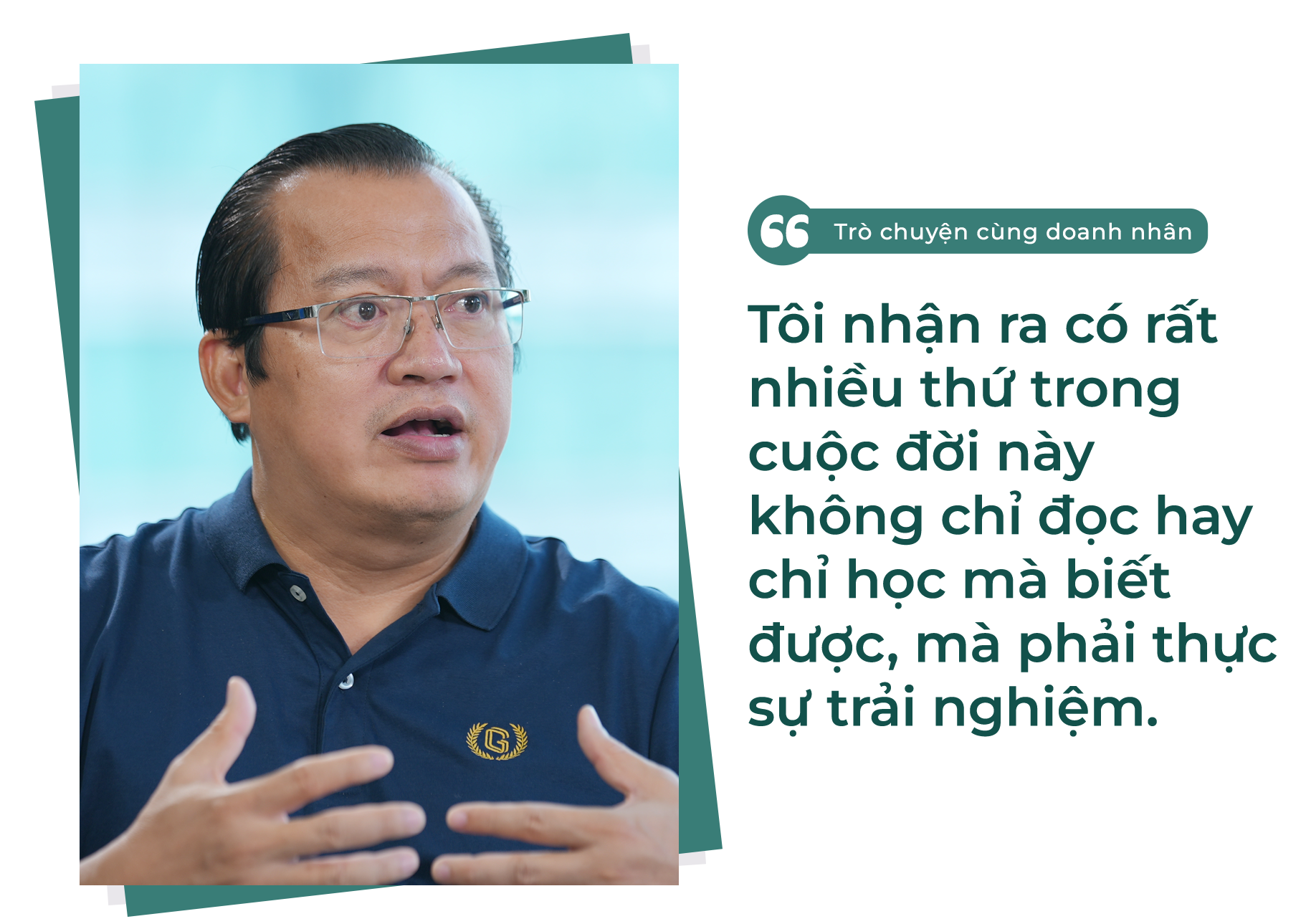
Thirdly, I enjoy being active, traveling, and socializing. I’ve found that with every journey, every person I meet, and every experience I go through, I learn something new and discover new joys.
Therefore, I always strive to experience life at the highest and fullest level possible.
– So, after 8 years of experience with Saigon Books, has this venture brought the results you desired?
Actually, I started Saigon Books with two main goals. The first was to achieve financial freedom. By starting my own business, I hoped that the company would grow, and my income would increase accordingly.
Secondly, I wanted time freedom. Previously, even as a Chairman of the Board of Directors and General Director of a listed company, when I wanted to travel, for example, I had to report and ask for permission. Additionally, when I left work to my deputy and traveled frequently, I felt unfair to them and the company. Since I was being paid by the company, I had a responsibility to be present and contribute.
Therefore, when I started my own business, I thought that as the owner, I could go wherever I wanted without feeling guilty.
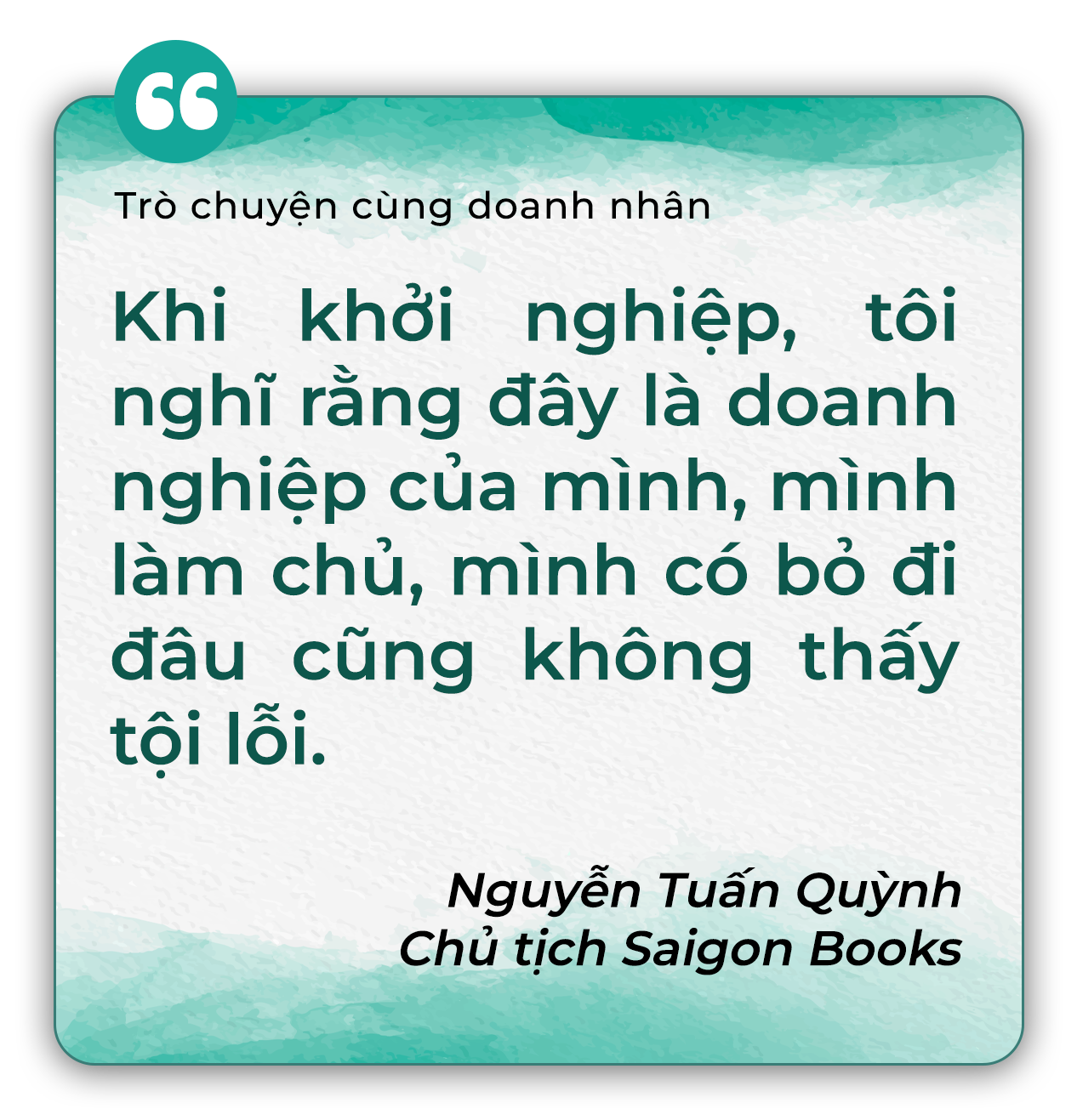
However, for a startup, I couldn’t afford to hire many people. So, in the early days, I took on multiple roles, including salesperson, cashier, and trade show attendant. In the end, my dream of time freedom remained unfulfilled.

– It seems that entrepreneurship has caused you to “lose” quite a lot!
Not long ago, I had a startup project that was just an idea, but I went out to raise funds for it. An investor found the idea interesting and agreed to invest 10 billion VND.
To implement the project, in addition to the partner’s investment of 10 billion VND, I had to contribute 5 billion VND, bringing the total capital to 15 billion VND.
However, after a year of spending all the money and looking back at the results, I realized that all my initial assumptions were wrong. This mistake led me to face the closure of the company, resulting in a loss of my 5 billion VND investment and the “angel investor’s” 10 billion VND.
Knowing that they invested in this project because they believed in me, I decided to return the money to the investor. In total, I lost 15 billion VND, considering it a business failure.
– What do you think you “gained” from these challenging entrepreneurial experiences?
The loss of 15 billion VND taught me two important lessons. First, I must be extremely careful in researching the market and testing the model before fully implementing it. Secondly, when I returned the money to the investor, they highly appreciated it and offered me another opportunity.
The “angel investor” knew that startup investments are risky, but they valued my courage and responsibility in returning their investment. As a result, they offered me another business opportunity, believing that working together would yield better results. Indeed, this new project helped me recoup the lost money. I realized that honesty is crucial in business.
More broadly, one of the most significant “gains” I think I’ve achieved after 8 years of entrepreneurship is a better understanding of myself.
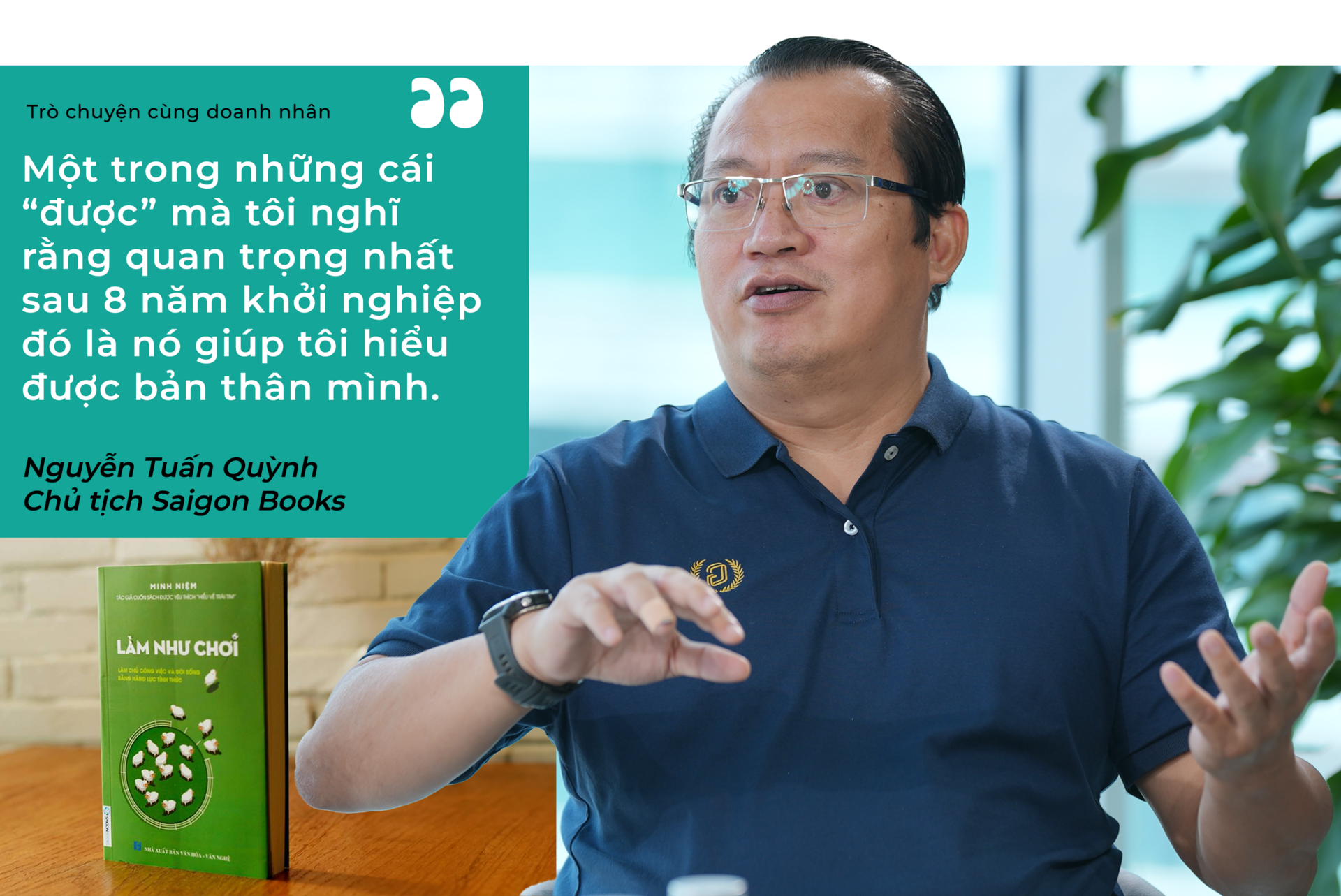
Previously, when leading large enterprises, I was very successful and received many awards and praise from colleagues and friends. This led me to believe that I was skilled and excellent at business. However, when I started my own business, I realized that I wasn’t as good as I thought; instead, I had an inflated sense of my abilities.
In the past, as a General Director, for a particular project, my subordinates would propose option A or option B, and based on those, I would come up with option C, which would often be much better and more effective. Consequently, I received praise from everyone.
When I started my own business, without a team to provide options A and B, I had to make decisions alone. In the end, I came up with option D, which turned out to be worse than options A and B. This made me realize that I wasn’t as skilled as I thought.
Another example is that because I thought I was capable, I took on too many tasks. From selecting books to buy copyrights to making marketing and sales decisions, I did it all.
I remember once, the editor-in-chief disagreed with my choice of books to buy copyrights for. They told me that the books I had chosen wouldn’t be bestsellers, but I replied that I had already made the decision, and they should just follow my lead. Although they did their best, the books ultimately failed to sell.
When I was reflecting on this failure, the editor-in-chief approached me and said that because they valued our relationship, they had followed my instructions even though they disagreed. This was a lesson that helped me recognize that I wasn’t as skilled as I thought.
Additionally, when I was leading large, successful enterprises, I was very generous with money when it came to employee benefits. I brought this habit into my startup, which led to two lines of thinking within the company. Some employees thought, “The boss is so generous; we can spend freely,” while others thought, “The boss is spending money like this, the company will go bankrupt. I should find another job.”
These “losses” helped me “gain” a better understanding of myself. They allowed me to identify my weaknesses and work on improving them, leading to positive changes.
– Between “gains” and “losses,” which do you think you’ve received more of?
For me, the “gains” far outweigh the “losses.”
When we understand ourselves, we can create value for those around us. After all these years and experiences, I’ve developed life philosophies that I follow and adhere to. One is to approach life with the eager eyes of a child and maintain a low ego to stay open to learning, easily make friends, and work collaboratively with others.
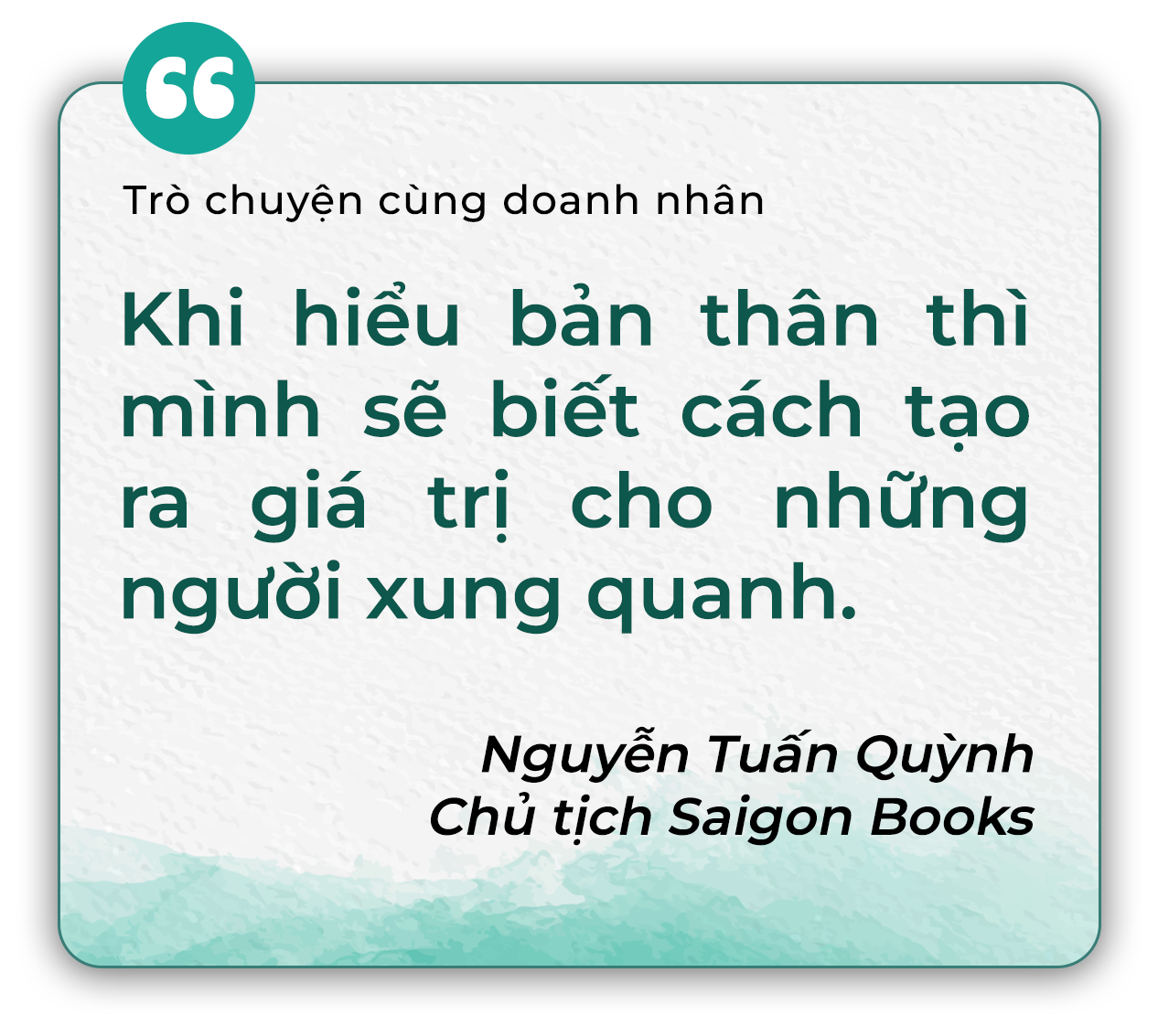
– How did you overcome the initial challenges of your entrepreneurial journey?
When I realized that I wasn’t as skilled as I thought and that I couldn’t just close the company, the next logical step was to find people who were better than me to work with. I learned to accept that for the things I didn’t do well, I needed to find others to take over.
I was fortunate to always be seen as a kind and gentle person in the company. So, I needed to find someone to play the role of the “bad guy” to manage the company on my behalf. Eventually, I found a CEO who was much better than me at running the business, making tough decisions, and controlling the company.
I stepped back into the role of Chairman of the Board of Directors, focusing on being the soul of the company, which is what I do best.
I truly empowered them. Before, I used to decide which books to buy copyrights for, but now the company has a council of five people to make those decisions, and I only have one vote. By inviting more colleagues, delegating tasks, and respecting their decisions, I was fortunate to revive Saigon Books.
Of course, another critical aspect when inviting and attracting capable and dedicated people is sharing benefits. I often joke that to be an entrepreneur, one doesn’t need to study much; just mastering the four basic arithmetic operations of addition, subtraction, multiplication, and division is enough. But among these, the most important one is division – sharing benefits. To retain talented people, one must know how to share benefits fairly. In my case, I always give more than what people expect.
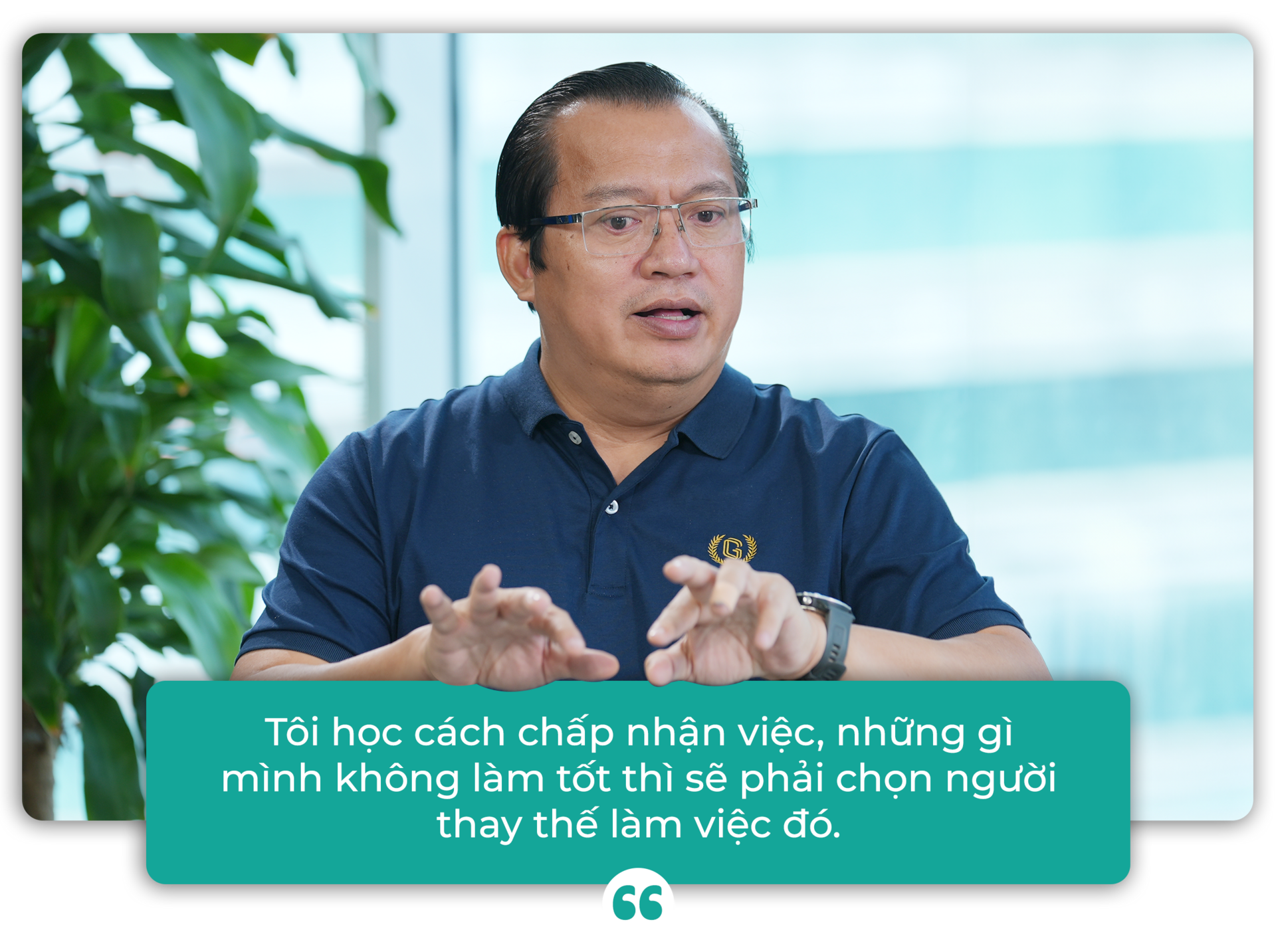
– You’ve held key positions in large corporations, but in your forties, you made some obvious mistakes. How did you feel in that situation?
I felt embarrassed! However, I’m also grateful for those mistakes as they helped me understand myself better.
I’m well aware that the journey of self-discovery and understanding is one of the most important aspects of life. Thanks to those setbacks, I now know myself better. I also know what to focus on, what to delegate, and, most importantly, that I can’t be good at everything.
Secondly, it taught me how to view life. Today is the result of the wounds, failures, and sorrows we’ve overcome in the past. Today is not the result of success but the product of our past hurts and failures.
Therefore, I cherish my failures. I see them as challenges that make me stronger, more understanding of myself, and more humble and gentle. They remind me to keep my ego in check.

– After 8 years, do you think the book market is more “lucrative” than when you first started?
It’s not entirely accurate to say it’s more “lucrative,” but the Vietnamese book market is still growing at a rate of 10-15% per year and has the potential for further development. I believe it will experience stronger growth in the near future.
– At this point, are you satisfied with what you’ve accomplished, what you have, and even what you’ve lost?
Yes! I’m content with my current life.
This doesn’t mean that I’ve achieved success, but I’m aware of how hard I’ve worked and how fortunate I’ve been. More importantly, when you look at your life at this moment and feel content, it means you’re satisfied with it.
In other words, you’re at peace with your past, even with the pain and failures.
– Being content doesn’t mean you’ve succeeded. So, do you feel pressured to achieve success?
We recently had a 35-year reunion with my classmates, and at the age of 52, we realized that those who were going to be billionaires already were, and those who were rich already were. It’s challenging to set drastic changes as goals at this
The Fashion Brand Lep’ Shuts Down: A CEO’s Heartfelt Letter on the Reasons for Closing After 8 Years
The fashion brand, Lep’, has just announced via their Facebook fan page that they will be closing all their stores. This surprising news has left many fans of the brand shocked and saddened. As Lep’ has built a strong reputation for its unique and trendy designs, this abrupt announcement has certainly caught the attention of the fashion industry and its loyal customers.
“Dr. Entrepreneur: Philanthropy, Child Welfare, and Gender Equality Champion.”
Dr. Nguyen Thi Phuong Thao, a prominent entrepreneur and one of Asia’s most powerful women, has been recognized by the prestigious Fortune Magazine in their 2024 list. Dr. Thao epitomizes the modern Asian woman, tirelessly contributing to the happiness and well-being of children and advocating for gender equality.
The Priceless Business Lessons from ‘When Women Take Charge’
To turn a million-dollar profit, these female entrepreneurs had to start from scratch with just a $50,000 investment and five hours on the clock. Their challenge? Translating their extensive business experience into success in an entirely foreign context.
Viettel Construction: Leading Listed Company in IR Excellence 2024
Viettel Construction’s unwavering commitment to transparency and openness in its corporate governance has been a pivotal factor in winning over investors, both domestic and international. The company is proud to have been bestowed with the prestigious “Mid Cap with the Most Favorite IR Activities by Investors in 2024” and “Mid Cap with the Most Appreciated IR Activities by Financial Institutions in 2024” awards at the IR Awards 2024 ceremony.
The Best Performing Mid-Cap IR of 2024: Unveiling the New Frontrunners
Following a rigorous survey, evaluation, and voting process, five mid-cap companies have emerged as the top performers in investor relations for 2024. These outstanding enterprises are CTR, FTS, TNG, GEG, and PAN. The winners were announced at the 14th IR Awards Ceremony held on September 24, 2024, organized by Vietstock, the VAFE Association, and FiLi Magazine.



















